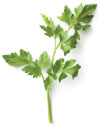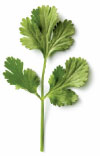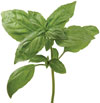Fresh herb primer
This article was originally published in September 2013
Washington-grown organic, fresh herbs are still in season! Try them in these recipes or other dishes with early fall produce.
Parsley

Parlsey is rich in antioxidants and vitamins. The most popular and widely available varieties are curly-leaf parsley and the more strongly flavored Italian (flat-leaf) parsley, which holds up better in cooked dishes. Add parsley at the end of cooking or raw as a garnish or in salads, or use it to freshen breath!
Storage tip: Shake off excess moisture, wrap in paper towels and put in a plastic bag; refrigerate for up to a week. To preserve excess flat-leaf parsley, dry it by laying it out in a single layer on a clean kitchen cloth. Curly-leaf parsley is best preserved by freezing. It’s best used in recipes without thawing.

Cilantro
Cilantro (also called Chinese parsley and coriander) has a lively, pungent fragrance and is used predominantly in Asian, Caribbean and Latin American cuisines. Its distinctive, fresh flavor pairs well with highly spiced foods. Both the leaves and tender stems can be used in fresh or cooked dishes.
Storage tip: Store for up to one week in a plastic bag in the refrigerator. Or place the bunch stem-down in a glass of water and cover with a plastic bag, fastening the bag to the glass with a rubber band. Refrigerate, changing the water every couple of days.

Lemongrass
One of the most important flavorings in Thai and Vietnamese cooking, a few stalks of lemongrass will perfume sauces, marinades, soups and curries with soft lemony flavor. Only the bottom few inches of the bulb and stalk typically are used in cooking, but the less flavorful leaves can be made into tea.
To use lemongrass, either bruise the stalk by pounding or mince it into pieces before adding to dishes. Because the plant is tough, lemongrass usually is removed once the dish is infused.
Storage tip: Store fresh lemongrass in the refrigerator, tightly wrapped in a plastic bag, for up to two weeks.

Basil
Called the “royal herb” by ancient Greeks, basil sometimes is described as a cross between licorice and cloves. It’s a key herb in Mediterranean cooking.
Storage tips: Refrigerate basil, wrapped in barely damp paper towels and then in a plastic bag, for up to four days. Or, store a bunch, stems down, in a glass of water with a plastic bag over the leaves. Store in the refrigerator for up to a week, changing the water every couple of days.
To freeze, finely chop clean basil and combine with a small amount of oil or water. Freeze in small portions (an ice cube tray works great).

Rosemary
Rosemary’s healthful compounds may stimulate the immune system, increase circulation, improve digestion and fight inflammation. It also has been shown to increase the blood flow to the head and brain, improving concentration. The herb’s green, needle-shaped leaves lend hints of lemon and pine to a variety of dishes. Try adding fresh, chopped rosemary to fruit salads, soups, vegetables, meat (especially lamb), fish and egg dishes and dressings.
Storage tip: De-stem, chop and freeze in baggies. This method loses the integrity of the leaf but keeps the flavor for sauces, stocks and stews.

Marjoram and Oregano
These herbs both are storehouses of potent nutrients. They taste similar and both complement meats, vegetables and tomato-based dishes. Oregano is not as sweet and has a more pungent flavor and aroma, so usually recipes call for less oregano than marjoram. Both herbs are best added toward the end of cooking.
Storage tip: Use same method as for preserving rosemary.

Thyme
Thyme is a powerful antioxidant with a long history of use in natural medicine in connection with chest and respiratory problems. The grey-green leaves give off a minty, light-lemon aroma. Lemon thyme, a common variety, has more pronounced lemon flavor. Thyme is used in French cooking and in vegetables, meat, poultry and fish dishes.
Storage tip: Freeze thyme on the stem in baggies. Add the whole stem to soups and stocks and remove stem when leaves fall off during cooking.
Storing excess herbs:
- If you have more lemongrass, rosemary, thyme, marjoram or oregano than you can use fresh but you don’t want to freeze the rest, infuse a bottle of olive oil or balsamic with them.
- Dry herbs in a dehydrator or out on the counter. When dry, de-stem and keep dried leaves in airtight jars.
PCC’s organic herbs come from HerbCo, a company founded in Duvall, Wash., in 1992 on 40 acres of land organically farmed for almost 100 years. It’s the first herb company to be certified Salmon-Safe.
